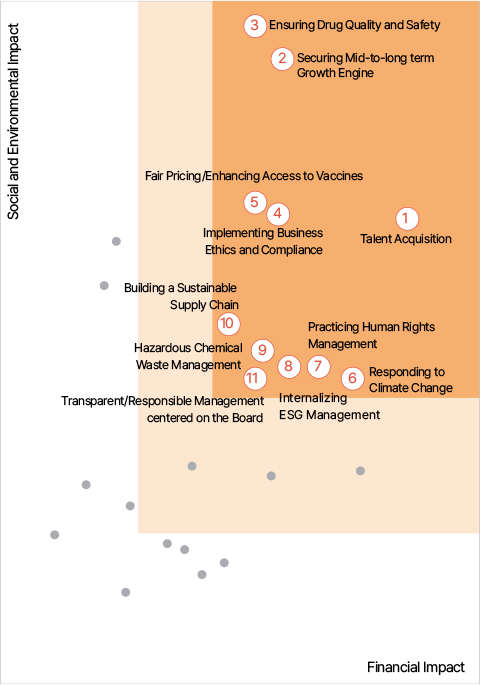OUR ESG APPROACH
Focus Issues
Focus Issues Menu
Double Materiality Assessment
SK bioscience conducted a Double Materiality Assessment to evaluate the impact of corporate sustainability issues on society and the environment. Additionally, the assessment aimed to evaluate the impact of external risks on the business and financial environments in which the company operates. The assessment involved a comprehensive analysis of international standards and evaluation indicators specific to the bio-industry. It also included benchmarking of companies in the same line of business, media research, and stakeholder surveys, deriving a pool of 24 issues. By analyzing the materiality and impact of these issues from both a financial perspective and a social and environmental perspective, 11 material issues were selected as priorities.
Double Materiality Assessment Process
-
Step1. Composition of a Pool of Issues
- Composing a pool of 24 issues specific to SK bioscience based on GRI Standards 2021, global initiatives, evaluation indicators, and analysis of companies in the same line of business and global leading companies
-
Step2. Assessment & Prioritization
- Level of Social and Environmental Impact
-
- Benchmarking with companies in the same line of business and golbal leading companies
- Analyzing media related to economic, environmental, social performance, and ESG issues
- Survey and analysis of internal and external stakeholders such as employees and external experts
- Level of Financial Impact
-
- Analysis and reflection of international standard indicators such as MSCI, SASB, etc.
- Analysis of corporate ESG strategy
- Survey and analysis of employees in the financial field
-
Step3. Selection of Material Issues
- Quantifying the social, environmental, and financial impact by issue. And deriving 11 issues after conducting a comprehensive assessment
- Internal review of the 11 issues and confirmation of final material issues
- Environment: 2 / Social: 5 / Governance: 2 / Business: 2
Double Materiality Assessment Results

| Rank | Area | Issue |
|---|---|---|
| 1 | S | Talent Acquisition |
| 2 | B | Securing Mid-to-long term Growth Engine |
| 3 | S | Ensuring Drug Quality and Safety |
| 4 | G | Implementing Business Ethics and Compliance |
| 5 | B | Fair Pricing/Enhancing Access to Vaccines |
| 6 | E | Responding to Climate Change |
| 7 | S | Practicing Human Rights Management |
| 8 | S | Internalizing ESG Management |
| 9 | E | Hazardous Chemical Waste Management |
| 10 | S | Building a Sustainable Supply Chain |
| 11 | G | Transparent/Responsible Management centered on the Board |
| 12 | E | Minimizing Environmental Impact through SHE Management |
| 13 | G | Voluntary Compliance with Fair Trade Laws and Regulations |
| 14 | S | Promoting Workplace Safety & Health and Employee Health |
| 15 | S | Information Security Management |
| 16 | S | Expanding Community Participation |
| 17 | E | Establishing a Circular Economy System |
| 18 | G | Company-wide Integrated Risk Management |
| 19 | G | Strengthening Stakeholder Communication and Disclosure |
| 20 | G | Expanding ESG Management Activities |
| 21 | B | Expanding Business-related Social Value (SV) Creation |
| 22 | B | Transparent Tax Management and Payment |
| 23 | G | Protecting Shareholder Rights |
| 24 | S | Implementing Customer-centered Management |
Material Issue Management
| Material Issue | Governance | Strategy & Risk Management | Activity & Performance |
|---|---|---|---|
| Talent Acquisition |
|
|
|
| Securing Mid-tolong term Growth Engine |
|
|
|
| Ensuring Drug Quality and Safety |
|
|
|
| Implementing Business Ethics and Compliance |
|
|
|
| Fair Pricing/ Enhancing Access to Vaccines |
|
|
|
| Responding to Climate Change |
|
|
|
| Practicing Human Rights Management |
|
|
|
| Internalizing ESG Management |
|
|
|
| Hazardous Chemical Waste Management |
|
|
|
| Building a Sustainable Supply Chain |
|
|
|
| Transparent/ Responsible Management centered on the Board |
|
|
|

